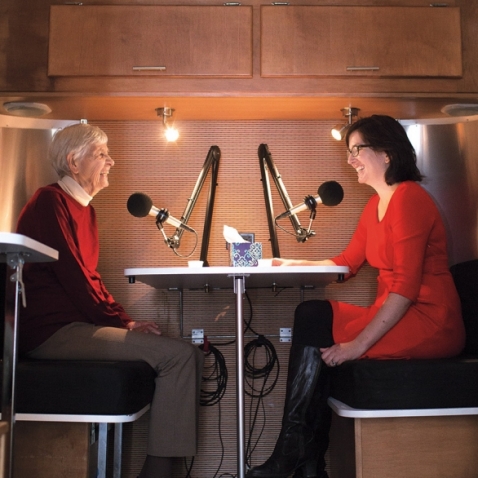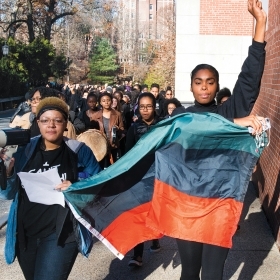Photography by Kathleen Dooher
Last October, Maud Hazeltine Chaplin ’56 and Lisa Scanlon Mogolov ’99 climbed into a silver Airstream on campus and stepped back into the 1950s. The trailer housed a mobile recording studio where StoryCorps—known as “America’s oral-history project”—was collecting Wellesley stories from alumnae, students, and faculty.
In their 40 minutes before the microphones, Chaplin, a retired professor of philosophy, and Mogolov, a senior associate editor of this magazine, discussed topics ranging from early student activism (the class of ’56 wanted an African-American commencement speaker) to Sophomore Father’s Day. Chaplin recalled shopping for corsages for a father-daughter dance with her roommate’s dad—who happened to be Nelson Rockefeller, future vice president of the United States. Mistaken for a florist in a shop in the Vil, Rockefeller played along and whipped up a flower arrangement.

Eighteen interview groups recorded their stories on campus and in New York City last fall as part of the launch of the Campaign to advance the Wellesley Effect: a former College president and her Pulitzer Prize-winning sister; a grandmother, mother, and daughter (all alumnae); business leaders; and many more.
Since its founding in 2003, StoryCorps has recorded more than 60,000 interviews with more than 100,000 participants from all walks of life. It is the single largest collection of human voices ever gathered, and the Wellesley stories will join this group being housed at the American Folklife Center at the Library of Congress. All of the Wellesley interviews will also be part of the College archives, and a selection will soon be available at campaign.wellesley.edu.
Alumnae are invited to share their stories through the StoryCorps mobile app. Download the app from storycorps.me, and email publicaffairs@wellesley.edu for login information.






We ask that those who engage in Wellesley magazine's online community act with honesty, integrity, and respect. (Remember the honor code, alums?) We reserve the right to remove comments by impersonators or comments that are not civil and relevant to the subject at hand. By posting here, you are permitting Wellesley magazine to edit and republish your comment in all media. Please remember that all posts are public.